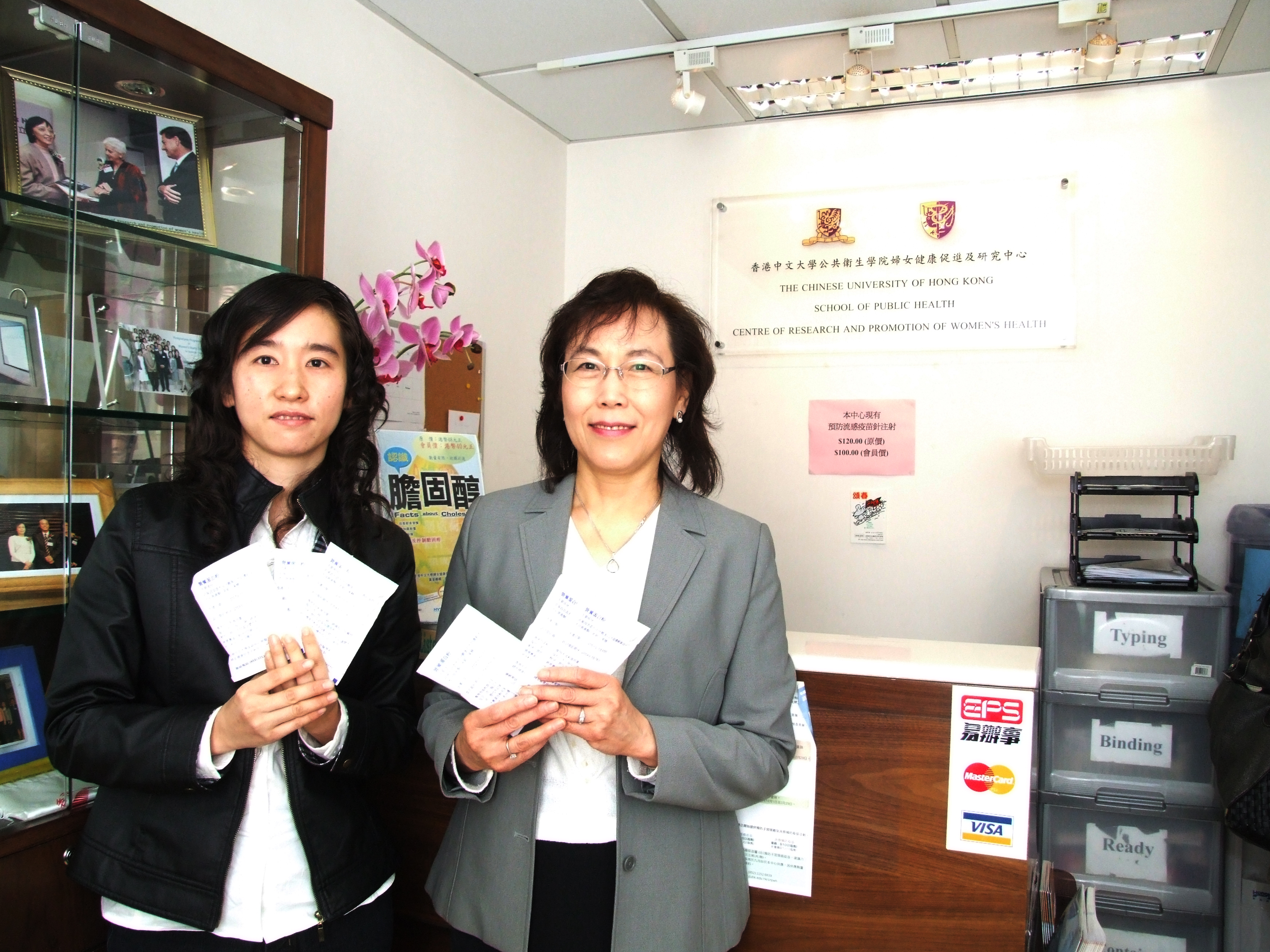CUHK
News Centre
CUHK Study on the Problem of Increased Diabetic Female Patients in Hong Kong
Diabetes is one of the major chronic disease epidemics in Hong Kong . It is estimated that there are currently around 700,000 diabetic patients in Hong Kong . Diabetes is also known as an "insidious killer". Patients of diabetes show no symptom at their early stage, but as the disease develops, there will be severe complications like blindness, amputation, cardiovascular diseases and renal failure. Therefore, an effective primary prevention strategy at the early stage of diabetes is urgently needed to prevent its progression and complications.
Patients of prediabetes, a state prior to the development of full diabetes, usually have a higher blood glucose level, though not high enough to be diagnosed as diabetes. Prediabetes can be assessed either by fasting status (at which the impaired fasting glucose (IFG) level may range between 5.6 ~7.0mmol/l) or by 75g glucose tolerance test (at which the impaired glucose tolerance (IGT) at 2-hour postprandial glucose level may range between 7.8 ~11.0mmol/l). Both values are often diagnosed to be prediabetes and substantial evidence has indicated that people with IFG and IGT have higher risk of progressing to future diabetes and cardiovascular diseases.
When women enter into menopausal stage, their endogenous estrogen secretion will reduce dramatically, thus increasing the risk of developing diabetes. Recent data has shown that, among Hong Kong women aged between 45 and 64 and those aged over 65, the prevalence of prediabetes is 8% and 18.9% respectively, indicating that the prevalence increases with age. International Diabetes Federation predicted that by 2025, Hong Kong will be one of the top 10 regions in the world with the highest prevalence of diabetes and pre-diabetes.
The Center of Research and Promotion of Women's Health of the School of Public Health at The Chinese University of Hong Kong (the Center) carried out a 3-year cohort study among 508 menopausal women randomly recruited from the local community. The results of the study indicated that more than 10% of the postmenopausal women had diabetes, and the prevalence of impaired fasting glucose reached 12.1%. Among them, around 10% of the women with normal fasting blood glucose transited to IFG (one index of prediabetes) after 3 years, and another 10% of the women with IFG developed to full grown diabetes in 3 years. Most of them showed significant increase in body weight or waist circumference, or diminished physical activity. This suggested that overweight and a sedentary life style may be the major risk factors of progression from normal state of health to prediabetes or from prediabetes to diabetes.
Aging, obesity, family history of diabetes, physical inactivity, diminished insulin sensitivity, hypertension and dyslipidemia are all established risk factors for both diabetes and prediabetes. Our cohort study also showed that 43% of the menopausal women were overweight or obese (with BMI≥23). About 30% of the subjects had hypertension, more than 70% and about half had elevated total cholesterol and triglycerides level respectively. Almost half of the menopausal women lacked sufficient physical activities. Overall, more than half of the subjects concomitantly possessed at least 2 risk factors for developing diabetes. In view of the situation, it is imperative to take effective measures to reduce the prevalence and retard the onset of diabetes.
Diet modification is one of the most effective methods in diabetes prevention. Existing studies have shown that food with high quality protein (milk protein or soy protein, both classified as complete protein), low-fat and low-glycemic-index diets are helpful in bodyweight maintenance and blood glucose stabilization. Better glycemic control benefits not only diabetes management, but also lipids regulation and reduction of bone loss. Both animal and human studies have suggested that diets supplemented with soy protein and soy isoflavones can improve insulin sensitivity and glycemic control. Soy isoflavone, a type of phytoestrogen, sharing similar molecular structure with human endogenous estrogen, demonstrates part of the estrogen functions without the adverse effects of exogenous estrogen.
The Center is currently conducting a six-month research programme to examine the effectiveness of protein powder (main ingredients: soy protein / milk protein isolate, soy isoflavones) on the promotion of women’s health. The study is presided by Prof. Suzanne C Ho, Director of the Center. Eligible subjects will be given the above-mentioned protein supplement for 6 months with a daily dosage of 25g. The change on blood glucose and lipid profile will be monitored at the mid-term and upon completion of the study.
CUHK welcomes women with the following profiles to join the Center's study entitled "Nutritious Protein Powder and Women's Health Promotion Programme": aged between 50 and 70, having entered into postmenopausal stage (without menstruation for at least 12 months), willing to take the supplements for at least half a year as well as to receive blood examination. Priority will be given to women who have borderline hyperglycemia or known diabetes with no need to take medication treatment. Eligible participants will be provided with protein supplement for 6 months and the opportunity of blood tests and physical examinations for 3 times for free. Only part of the eligible subjects can be enrolled into the study due to limited resources. Interested parties can contact Ms Liu Zhaomin at 2252 8798 during office hour, or download the registration form from the Center's website.
For enquiry, please contact:
Center of Research and Promotion of Women's Health, School of Public Health, The Chinese University of Hong Kong
Contact person: Ms Liu Zhaomin
Contact number: 2252 8798, 2252 8743; Fax: 2602 4360
Website: http://www.cuhk.edu.hk/crpwh/
Mailing address: 4/F, School of Public Health , Prince of Wales Hospital



